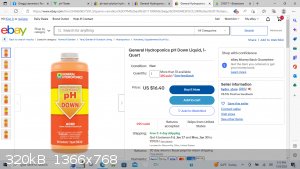Yttrium2
Perpetual Question Machine
    
Posts: 1104
Registered: 7-2-2015
Member Is Offline
|
|
What is this acid? Can I use a substitute?

|
|
|
Yttrium2
Perpetual Question Machine
    
Posts: 1104
Registered: 7-2-2015
Member Is Offline
|
|
Also, is ph test solution more fool proof than ph meter?
|
|
|
UC235
National Hazard
   
Posts: 565
Registered: 28-12-2014
Member Is Offline
Mood: No Mood
|
|
https://generalhydroponics.com/resources/ph-down-liquid-safe...
Mixture of phosphoric acid, monoammonium phosphate, and citric acid (probably helps prevent metal phosphate precipitation).
I'm not sure what you mean by pH test solution (universal indicator drops?) but a properly calibrated pH meter is extremely accurate.
|
|
|
ave369
Eastern European Lady of Mad Science
   
Posts: 596
Registered: 8-7-2015
Location: No Location
Member Is Offline
Mood: No Mood
|
|
A substitute for what? It won't work as a substitute for any specific acid such as sulfuric. However, it will work as a source of H3O+ ions in some
reactions.
Smells like ammonia....
|
|
|
Mateo_swe
National Hazard
   
Posts: 541
Registered: 24-8-2019
Location: Within EU
Member Is Offline
|
|
When doing chemical experiments you want a pure reagent that isn't mixed with other stuff because the other stuff is going to interfere with your
reaction and give bad/wrong results.
You can extract reagents from OTC products but it is often not so easy unless you find a documented procedure how to do it.
Better to buy pure reagents, some can be found at the hardware store like for example hydrochloric acid.
There are some reagents that can be found at food stores like ascorbic acid, sodium benzoate and others.
The spice section usually have some useful stuff.
What you need an acid for?
If you dont tell the specific reaction/experiment you going to do its impossible to recommend a substitute chemical.
Seems like you just throws out lots of random questions, people are going to start ignoring you if you continue.
Search and read up on what you are interested in before asking questions.
|
|
|
Texium
Administrator
       
Posts: 4580
Registered: 11-1-2014
Location: Salt Lake City
Member Is Offline
Mood: PhD candidate!
|
|
Quote: Originally posted by Mateo_swe  | Seems like you just throws out lots of random questions, people are going to start ignoring you if you continue.
Search and read up on what you are interested in before asking questions. |
You’d think so, but he’s been
doing this here for 8 years and people still answer him.
|
|
|
violet sin
International Hazard
    
Posts: 1480
Registered: 2-9-2012
Location: Daydreaming of uraninite...
Member Is Offline
Mood: Good
|
|
IIRC, I grabbed the pH up from them years back as a source of K+ while away from home. Using these for lab purposes is best avoided if you can help
it. Better bet would be go to the hydroponics store in person and see what else they have on hand. 30% peroxide can sometimes be found pretty
affordably. Or look longer online and have an idea of one project to accomplish at a time. Build reagents stock slowly, if you infact have enough
time and space to do them safely. Plan to succeed, if you fall shy, you're still closer than if you merely set out to be amused.
|
|
|
unionised
International Hazard
    
Posts: 5126
Registered: 1-11-2003
Location: UK
Member Is Offline
Mood: No Mood
|
|
And I should know better- but I was curious.
This is what the first page Google found for me says
"The acid formulation uses food grade phosphoric acid to lower the pH to the proper level. Widely recognized as a consistent and reliable product".
From
https://generalhydroponics.com/products/ph-down-liquid/
If you are trying to grow plants hydroponically, you could possibly use other acids but phosphate is a useful nutrient, so it's a good choice.
A lot of rust removers are based on phosphoric acid but (1) nobody cares much about impurities in them and (2) they often include detergent/
surfactant so, even if they are cheap, they may be unsuitable.
And, if you are doing hydroponics a narrow range pH indicator (solution or papers) is probably good enough.
|
|
|